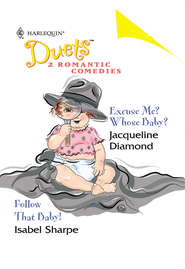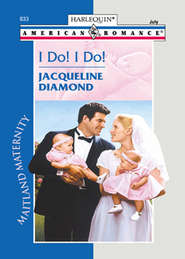По всем вопросам обращайтесь на: info@litportal.ru
(©) 2003-2024.
✖
Surprise, Doc! You're A Daddy!
Автор
Год написания книги
2018
Настройки чтения
Размер шрифта
Высота строк
Поля
If only he knew what had happened during that lost time!
“As for my leaving, it may be a moot point,” he told his brother. “I haven’t heard from the project, so it doesn’t look like I’m going anywhere.”
“Good.” Andrew checked his watch. “No wonder Helen isn’t bugging us. It’s time for lunch.”
Helen Nguyen was their nurse and, with patients prepped in the examining rooms, would never have allowed them to chat for so long. However, no appointments were scheduled between noon and 1:00 p.m.
“Where shall we go?” Hugh asked. Every Wednesday, the two of them lunched at one of the many restaurants in the area.
Once or twice, he’d had in inexplicable urge to point out to a waiter when he noticed an uncleared table or a messy front counter. It made him wonder whether he might have worked in a restaurant while he was gone, but that didn’t give him much to go on.
Chelsea Byers, their receptionist, appeared behind Andrew, pushing back a strand of her newly dyed maroon hair. “Excuse me.” They both turned toward her. “There’s a woman here without an appointment.”
“Tell her to make one for later,” Andrew said.
“We’re full all afternoon, and she says she’s driven a long ways.” Chelsea bounced a little, as if she were dancing at one of the trendy nightclubs she often mentioned. “Her little girl has an ear infection.”
“If she comes back after lunch, I’ll work her in,” Hugh said. “Have we seen her before?”
The receptionist shook her head, raising an odd-colored cloud. “She doesn’t have insurance, either.”
“Oh, for heaven’s sake!” Andrew snapped. “This isn’t the welfare office. Where’s Sandy?” Sandy Craven, their office manager, was in charge of making sure bills got paid.
“Sandy already went to lunch. The woman said she can pay cash,” Chelsea answered. “I’m sorry. I’ll tell her she has to arrange payment with Sandy and then make an appointment.”
Annoyance at his brother’s high-handed attitude spurred Hugh to intervene. “Never mind. I’ll see her now.”
It was highly irregular and an imposition on Helen, who would need to weigh the little girl and take a brief medical history. Ear infections hurt, though, and he didn’t want the child to suffer.
“Don’t wait. Go ahead without me,” he told Andrew.
“I’m not hungry.” Although clearly disgruntled, his brother accepted defeat without further argument.
It occurred to Hugh that, if he did get the research position, Andrew could find a partner who more closely shared his values, someone like Hugh used to be. Maybe that wouldn’t be such a bad thing.
A few minutes later, Helen handed him a chart. “Don’t wait,” Hugh said. “I’m sorry I used up part of your lunch.”
“You might need me,” the nurse warned.
“Thanks, but I’ll handle whatever comes up.” He wasn’t too snooty to administer a shot if necessary.
After Helen left, Hugh glanced at the chart. The child’s name was Dana Avery, age two years. No surgeries or major medical problems. Mother’s name Meg, father’s name Joe.
Joe Avery. It had a familiar ring, but he couldn’t place the man.
Hugh tapped on the door and stepped into the examining room. A small girl with bright green eyes and Little Orphan Annie red hair sat on the examining table, her hands folded in her lap.
It was the sight of the woman standing beside her that, inexplicably, made Hugh’s breath come faster. Despite the well-worn blouse and jeans, despite the frizzy reddish-brown hair pulled into an ungracious ponytail, there was something riveting about her.
She was staring at him, too.
“Hello, I’m Dr. Menton.” Hugh extended his hand. Dazed, she shook it.
He wanted to ask why she looked so startled, but it seemed intrusive. Hugh’s natural reserve would have held him back even if he hadn’t been concerned about professionalism.
“You must be Dana,” he told the little girl. “Which ear hurts?” She pointed to the left. The child had delicate features and the same alert expression as her mother, he noticed.
“Are you Daddy?” she asked as he examined the ear.
“Dana!” Meg Avery found her voice at last.
“Mommy, you said…”
“No, honey. I’m sorry, Doctor.”
“It’s all right.” Hugh was accustomed to hearing kids blurt out unexpected remarks. “Young children see any adult male as a daddy. It’s a generic category.”
“‘Generic category.”’ Nervously, the woman pushed back a strand of hair. “That’s how you used to talk, using those formal words, and I couldn’t figure it out!”
“Excuse me?”
“I mean, someone I know talked that way.” The woman took a deep breath, as if fighting the urge to say more.
Hugh hoped she wasn’t unbalanced. Perhaps Andrew had been right to be wary of a new patient who turned up without an appointment.
“Your daughter does have an infection.” Briskly, he reached for his pad. “I’m going to prescribe an antibiotic and a decongestant. Make sure she takes all the antibiotics, and have her rechecked in two weeks. You can take her to her regular pediatrician if you prefer.”
Meg bit her lip as she took the slip from his hand. Perhaps money was a problem, Hugh thought.
“If you can’t afford to fill the prescription, I have some samples in my desk,” he said.
Quickly, she shook her head. “I pay my bills.”
“I’m sorry.” He hadn’t meant to offend her pride. And, instinctively, he knew she had a lot of it.
In fact, he felt as if he knew many things about her. That she laughed infectiously. That she was an easy touch for a friend in trouble, but tough as nails toward anyone who tried to rip her off.
He must be imagining things.
“You really don’t recognize me, do you?” Meg asked.
“Not offhand,” Hugh said. “Have we met?”
“I don’t know.” She hesitated, shifting from foot to foot as if unsure whether to ask him another question or bolt from the room.
“Did someone refer you to me?” he asked.
“No. Yes.” She gave an apologetic shrug that was inexplicably familiar. “My brother Tim saw your picture in the newspaper. He’s a truck driver and he stops in L.A. sometimes.”











